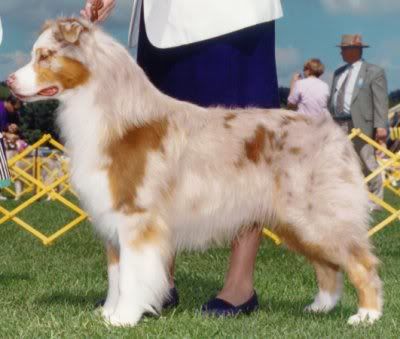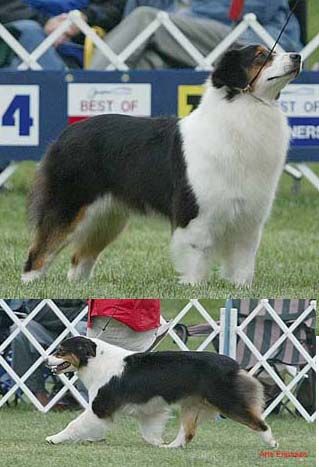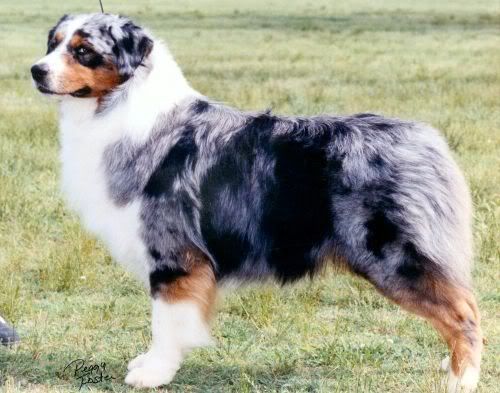Sziasztok!
Nagyon szépek ezek a kutyik! Nekem három collie-m volt eddig, és ez a fajta feltűnően hasonlít a collie-ra. Ugyanakkor azt olvastam, hogy baszk terelőkutyáktól származtatják. Én személy szerint nehezen tudom elképzelni, hogy Ausztáliába brit felséterületként annak idején inkább baszk, mint brit (azaz skót juhász) kutyákat vittek volna, legalábbis logikai alapon. Szerintem sokkal jobban hasonlít a collie-ra, mint pl. a pireneusi kutyára.
Ti mit tudtok erről? Mi a véleményetek? | | |
WTCH VCH Spring Fever Mollie Rock CDX
1968-ban született

Egy 1973-ban született aussie, CH Chulo Rojo of Fairoaks

maim idők:


Rineweld Collies | | |
CH McGuire's SeMeGo Hemi, UDT, STDds, OTDc
1968-ban született
" "Hemi" was the first Aussie to become "triple titled" at the time

WTCH CH Windsongs Raisin Cain CD HOF
1976-os születésű

CH Briarbrooks Broadway Joe, 1980-ban született

Propwash Hey Jude 1992-ben született

Rineweld Collies | | |



AKC/ASCA CH. Caledonia's Crowd Pleaser ROMXIII
"ASCA Hall of Fame Sire #64"
1990-ben született

ASCA CH Brighwood's Fire N' Ice
1982-ban született

Mégegy barna, bár a képen inkább "ausztrál vörösnek" látszik!
Thornapple Code Red.

Rineweld Collies | | |

Aust Ch Leesway Smokin Ash

Ch Dykinta American Express

Aust Ch Sasin Bravo Storm Cloud | | |
History of the Aussie
The Australian Shepherd was actually developed in America but there is much debate over the origins of the foundation stock. It is believed the dogs traveled over with flocks of Merino sheep and the Basque Shepherds who tended them. Some contend they came to Australia from Spain when the first Merino sheep arrived and then traveled to America. Others believe they were Australian Sheepdogs derived from the Smithfield and some type of collie, possibly the German Coolie or it's ancestor. More recently the theory has been put forward that the dogs traveled to Australia directly from Europe with Merino flocks. The name came about because of the believed link with this country and the herding of Australian Merino Sheep.
Further historical research needs to be done but there is evidence that this type of dog has been worked here in the past and documentary evidence showing animals have been sent from Australia to America as late as the 1950's. Once in America the Aussies were used to work sheep and later cattle, developing quite a reputation as a working dog. Legend has it that these dogs were held in reverence by the Indians because of their unusual and often blue eyes., therefore, they came to be called the "ghost-eyed ones" the Indians left these sacred "spirit" dogs and their owners unharmed. The Aussie has been elusive, at least in documentation of his origin. Now days they are very popular as a family pet, an obedience and agility dog, a worker and more recently as a show dog.
THE PRESENT
In America Aussies were fully recognised by the American Kennel Club in 1993. The delay in recognition was caused by the fear that the dogs would be bred for the conformation ring only which could lead to a loss of their working ability. The United States Australian Shepherd Association (USASA) is the AKC recognised parent club for the Aussie. The Australian Shepherd Club of America (ASCA) is the original parent club for the Aussie and they hold herding, conformation, obedience and agility trials at which competitors can earn titles.
In Australia the breed is in it's infancy, Mrs. Shirley Ford (re) introduced the breed in 1990 when she emigrated from England with family and four Aussies, further imports have since arrived which has increased the breeding stock dramatically with Aussies being represented in all States of Australia. The breed was fully recognised by the Australian National Kennel Council (ANKC) on the 1st January 1994. The Aussie is becoming more popular with time and is competing in Conformation, Obedience, Agility, Endurance and some have even progressed into the field of Therapy dogs.
| | |
íme egy "RED TRIE" színü
 | | |
Gyönyörű juhászkutya sokféle, igazán szép színnel. Emlékeztet a borderre, és persze különbözik is tőle. És már van idehaza ! 
Sok sikert!
| | (TÉMANYITÓ) |
|

